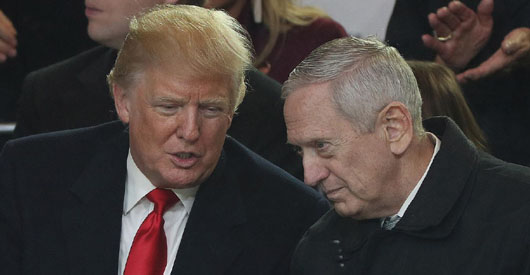Special to WorldTribune.com
 By Donald Kirk
By Donald Kirk
U.S. President Donald Trump is determined to stick to the ban on joint U.S.-South Korean military exercises despite North Korea’s failure to begin to take steps toward “complete denuclearization” as promised by North Korea’s Kim Jong Un in their summit in Singapore in June.
Trump tweeted there was “no reason at this time to be spending large amounts of money” on war games with the South Koreans after Mattis had said there were no plans to cancel future joint military exercises.

Trump’s comment appeared to show disagreement with Mattis and top military commanders, who see joint exercises as essential for close coordination between South Koreans and Americans in case of war. At the same time, both their views could be interpreted as veiled warnings to Kim Jong Un to prove he’s serious about getting rid of his nuclear warheads and missiles along with the facilities for making them.
While finding “no reason” to conduct war games right now, Trump was careful to note, “The President can instantly start the joint exercises again with South Korea, and Japan, if he so chooses.”
His next sentence was still more threatening.” “If he does” order war games, he warned, “they will be far bigger than ever before.”
Trump’s remarks were interpreted right away as meaning that he still dreams of building on the atmosphere of good-will engendered at the Singapore summit. The media focused on his finding “no reason” for exercises rather than on what might be interpreted as an echo of the harsh rhetoric of last year when he warned “little rocket man” of the “fire and fury” that would descend on him if he tried to make good on his threats to fire a nuclear-tipped long-range missile in the direction of the U.S.
Two days earlier, Mattis, in his first press conference in five months, indicated that the U.S. was fed up with Kim Jong-un’s refusal to get rid of his nukes and missiles.
Mattis’ remarks appeared carefully phrased, perhaps coordinated with John Bolton, Trump’s national security adviser. The quote that made headlines was, “We have no plans at this time to suspend any more exercises.”
In other words, Mattis seemed upset about cancellation of the Ulchi Freedom Guardian war games that had been scheduled for this month and wanted to make clear that future war games were still possible if not like. After all, he said, “We took the step to suspend several of the largest exercises as a good-faith measure coming out of the Singapore summit.”
If Trump and Mattis seemed to disagree, it was really in what they chose to emphasize. Both of them held out the possibility that war games could be held in coming months – though clearly Trump still clings to the hope of remaining on good terms with Kim, with whom he has maintained he developed “good chemistry” in Singapore.
“North Korea is under tremendous pressure from China because of our major trade disputes with the Chinese Government,” said a statement issued by Trumps office, accusing China of violating sanctions by shipping “considerable aid, including money, fuel, fertilizer and various other commodities.”While the president sought to maintain “a good and warm relationship” with Kim, said the statement, posted in Trump’s twitter account, China was “not helpful!”
Military commanders, however, still think joint exercises are vital to the defense of South Korea. General Vincent Brooks, commander of the 28,500 U.S. troops in South Korea, sought to give the impression that his troops, and the South Korean forces whom they support, could find other ways to stay in fighting trim.
“Exercises are exercises,” Brooks told journalists at the Seoul Foreign Correspondents’ Club. “We adjust depending on what is needed.”
Cancellation of Ulchi Freedom Guardian “was to create room for traction,” he said, meaning that the war games were called off so the U.S., South Korea and North Korea would be able to maneuver politically and diplomatically without having to worry about the impact of intimidating military exercises at the same time.
Brooks added, emphatically, “I received no order to stand down, to become unready.”
The general was equally sanguine about shutting down some of South Korea’s 60 guard posts on their side of the demilitarized zone between the two Koreas. “Closing of guard posts is a good example of a tension-reducing measure,” he said. “It may help to reduce tensions fo ran incident recurring.” Yes, he went on, “I support these initiatives that can reduce tensions along the DMZ.”
Nonetheless, Brooks betrayed certain misgivings when he remarked, “There’s no doubt, the more integrated the training experience, the greater the readiness.” In the meantime, he said, “We have tried to find other ways” – meaning small-scale exercises involving U.S. and South Korean forces operating alone. “They won’t be the same as if we had a large combined ‘everybody-in-the-game’ experience,” he said, but “as a military commander I am expected to deal with change, to find ways to deal with the problem.”
And he left no doubt he believed U.S. and South Korean forces were ready to fight if North Korea again threatened the region, and the U.S., with weapons of mass destruction. “We’ve been told for now to put our sword back in the sheath,” he said, “but we have not been told to forget how to use it.”
